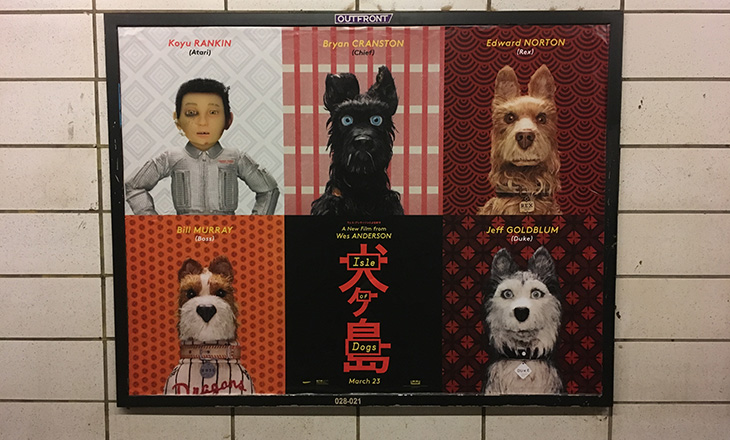Apparently, if you pummel people with enough marketing, eventually they will see your movie. My girlfriend and I saw the trailer for Isle of Dogs before every movie we saw over the past two months. “The Japanese archipelago, twenty years in the future…” It was cute at first. “… canine saturation has reached epidemic proportions…” Then it got annoying. “… an outbreak of dog flu rips through the city of Megasaki…” I guess it’s our own fault for being Brooklynites and seeing movies at BAM and Alamo Drafthouse. “We should probably see that, right?” “Yeah, I think we have to.” We went into the movie with an air of alright, let’s get this over with.
That being said, it was great. I never saw The Fantastic Mr. Fox but the stop motion animation was pretty awesome. I particularly liked the clouds whenever dogs rumbled.
Wes Anderson continues his tradition of slightly alternate universes. The Royal Tennenbaums took place in a place not unlike New York. Moonrise Kingdom took place somewhere not unlike New England (unless it was the Pacific Northwest, I couldn’t really tell). The Grand Budapest Hotel took place somewhere not unlike… Europe? And now Megasaki, Japan. (I just googled it to make sure it was in fact a fictional city.) A friend of mine described Moonrise Kingdom as a fairy tale, which I thought was bullshit at the time. But I’m starting to see his point. If you set a story in a place like a real place, it’s more fantastical.
So, uh, why Japan? I have to be honest here, this question was actually posed to me by a friend. I said that I thought it was okay with me as a white guy because any actor who spoke Japanese was played by a Japanese actor. Though, I admitted to my friend, who had not seen the movie and who is not white, that this is a pretty low bar. Anyway, feel free to take me to task on this.
I find that there’s a big difference in the movies Wes Anderson makes with people other than Owen Wilson. I found that Wilson was able to ground Anderson’s more whimsical ideas. For example, Anderson wrote The Life Aquatic with Noah Baumbach and I was kind of baffled by that movie and all of its fictional fish. It seemed like he had a fan as a writing partner rather than an equal. Isle of Dogs was from a story by Anderson, Roman Coppola, Jason Schwartzman, and Kunichi Nomura. So, it’s a little on the fantastical side again. (And the fact that a Japanese person was in on the story might help explain the “Why Japan?” question above. Maybe.)
In true Wes Anderson style, everything seemed to be hipsterly antiquated. Tracy Walker took notes by speaking into a mini tape recorder. Results of the dog serum were delivered via punchcard. Mayor Kobayashi stamped his decree on a official paper displayed via overhead projector. The translator (Frances McDormand) was using audio equipment that they used in Quiz Show and to announce the moon landing.
Spoiler alert. (Any article that I write about a movie contains spoilers, you get that by now right?) Tilda Swinton as the oracle (a pug) was the funniest part of the entire movie.
Tracy Walker, the American exchange student who is also the love interest of the movie, has a huge white girl ‘fro and many prominent freckles. Is Wes Anderson trying to up the manic pixie dream girl game? In The Grand Budapest Hotel, Saoirse Ronan had a birthmark in the shape of Mexico on her cheek. Margot Tennenbaum had a wooden finger. Why is he trying up the quirk factor with all of the love interests?
Liev Schreiber’s voice seemed to change halfway through his performance. What’s that about?
A friend of mine remarked on Facebook that this film colossally fails the Bechdel Test. However, my girlfriend pointed out that there is one scene in which two women talk about the serum to cure dogs. So, perhaps it passes? Again, feel free to point out how wrong I am here.
In The Life Aquatic, Cate Blanchett’s character had a line concerning her unborn son that eleven and a half is the best age. In Isle of Dogs, Scarlett Johanssen says to Bryan Cranston, you’re going to help him, “because he’s a twelve year old boy, dogs love those.” This is a consistent theme in all of Anderson’s films, I think. Even when it’s not explicitly stated like that, there’s a twelve year old mindset to friendship and loyalty.
Even though they’re from the POV of twelve year olds there’s always something that shocks you out of that world – Dignan punching Anthony in Bottle Rocket, “Not if you ever fucked before,” from Rushmore, Owen Wilson revealing his scars and the funeral in The Darjeeling Limited, the suicide attempt in Tennenbaums, here it’s the scientist getting poisoned and how it ruins the assistant.
I like all of Anderson’s new stable of actors. Murray’s been there a while but Harvey Keitel, Jeff Goldbloom, F. Murray Abraham, and Tilda Swinton. But man, there’s just something about hearing Edward Norton voice a dog.




